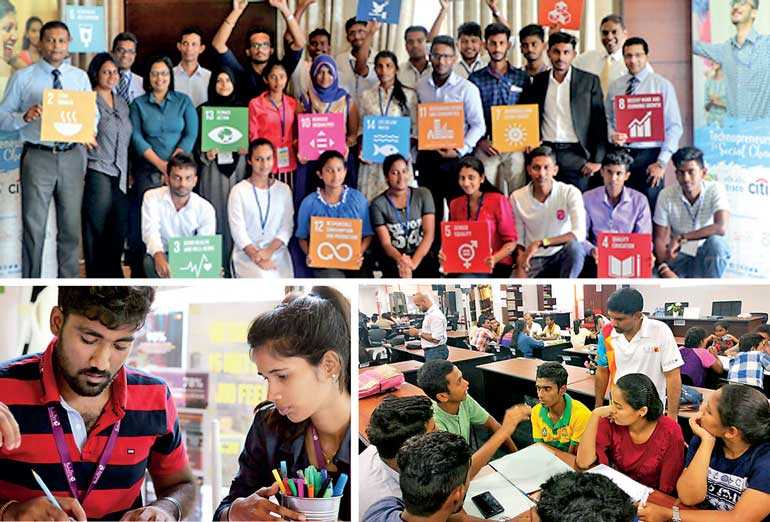Sunday Feb 22, 2026
Sunday Feb 22, 2026
Wednesday, 3 October 2018 00:00 - - {{hitsCtrl.values.hits}}
 Today’s generation of young people is the largest the world has ever known. One in every three people alive today is under the age of 30, and around 90% of these young people are living mainly in Asia and Africa. In Sri Lanka, nearly a quarter of the population comprises young people, which is why young people are a critical segment of the country’s population and a key focus of UNDP’s work.
Today’s generation of young people is the largest the world has ever known. One in every three people alive today is under the age of 30, and around 90% of these young people are living mainly in Asia and Africa. In Sri Lanka, nearly a quarter of the population comprises young people, which is why young people are a critical segment of the country’s population and a key focus of UNDP’s work.
This year, UNDP has partnered a range of stakeholders from the Government and the private sector to further invest in the potential of young people in the areas of technology, entrepreneurship and social innovation.
‘HackaDev’, the National Youth Social Innovation Challenge, is one such initiative which is a platform for young people to be a part of the solutions to development challenges within their communities. Co-financed by the Ministry of Telecommunication, Digital Infrastructure and the United Nations Development Programme, together with the Information and Communication Technology Agency of Sri Lanka and the National Youth Services Council, the challenge recently carried out nine idea auditions through nine provincial programs. Following the idea auditions, the 45 best social innovation ideas have now been selected for three five-day residential social innovation camps at three locations around the country throughout October, engaging 15 teams each.
At the camps, the teams will be taken through a journey of building, refining, mentoring and validating their idea, in a carefully designed program to support social innovation ideas in the Sri Lankan context. A total of 11 teams will receive seed funding and incubation support.
Earlier in the year, prior to the call for applications, the program successfully concluded an Ideation and outreach phase in 25 programs covering all districts of the country, engaging more than 2,500 young people.
Speaking about this, ICTA Sri Lanka Programme Manager Sachindra Samararatne stated: “The Idea Auditions were an interactive experience for the applicants where the teams were given an opportunity to present their innovative solutions to a comprehensive panel of judges. There were some very interesting solutions to some development issues so now we are excited to see how the selected teams will refine and validate these ideas with the knowledge and expertise shared at the five-day social Innovation camps in October.”
The program is being implemented in partnership with Citi, Citra Social Innovation Lab, Youth Co Lab, Dialog Ideamart and Expo Lanka Holdings Plc. HackaDev is a key element within the social innovation ecosystem which represents concrete action in engaging young people in a meaningful manner to facilitate their contribution to the development of the country and the 2030 development agenda. Bihan de Silva, a participant at the Idea Audition in the Sabaragamuwa Province, stated: “The idea audition was a space for our team to present our social innovation and hear other interesting ideas. This challenge is a very exciting opportunity for us and I am glad to be a part of it.”
Another flagship initiative is the ‘Technopreneurship for Social Change’ program, which focuses on catalysing social change by creating and empowering a large cohort of Technopreneurs in the country. The initiative reaches more than 1,000 young people around the country through 20 programs in 20 locations through e-learning courses on leadership, financial literary and entrepreneurship. Speaking about her experience, Hansani Erangika Palihawadana, a participant from Matale in the Central Province, stated: “I had always wanted to start my own business but it was just an idea and I didn’t know how to go about it. I heard about this program through our youth center and so I signed up immediately. Through the modules that were taught to us, I realised that it is actually a possibility. I am very excited now and confident that I can make it happen.”
The ‘Technopreneurship for Social Change’ is a joint initiative of the United Nations Development Programme, Citi, Cisco and the National Youth Services Council.
Speaking about this, Citi Sri Lanka Corporate Affairs Head Shanaka Waduge stated: “Citi is proud to partner the Technopreneurship initiative that empowers Sri Lanka’s youth by strengthening their capacity to develop their own social enterprises and entrepreneurship skills. Citi employees also greatly appreciate the volunteer opportunity this project has given them as facilitators, mentors and coaches. Citi is confident that this project will guide young entrepreneurs to steer their innovative solutions to empower and drive Sri Lanka towards a progressive nation.”
In a long-term and strategic effort to leverage the momentum within this ecosystem, the Government, UNDP and other relevant partners is expected to establish a Digital for Social Innovation Incubator, starting 2019. This will be a physical space that is set to become the epicentre of the entrepreneurship ecosystem and will support 20 startups every six months, amounting to 40 startups graduating from the incubator ready for further investment and support.
The incubator will be a key element in the journey of an idea to enterprise. The Digital for Social Innovation Incubator capitalises on the global trend to transform industries and systems through a fusion of digital technology and industry-specific knowledge for positive, sustainable social impact. It will be a springboard for ideas to become viable enterprises centred around social innovation and thereby substantively address a hiatus in the trajectory of Sri Lanka towards achieving sustainable development.